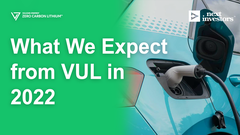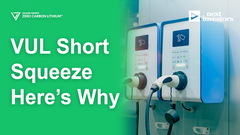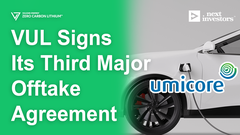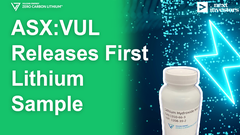Volkswagen leads Zero Carbon EV push
Hey! Looks like you have stumbled on the section of our website where we have archived articles from our old business model.
In 2019 the original founding team returned to run Next Investors, we changed our business model to only write about stocks we carefully research and are invested in for the long term.
The below articles were written under our previous business model. We have kept these articles online here for your reference.
Our new mission is to build a high performing ASX micro cap investment portfolio and share our research, analysis and investment strategy with our readers.
Click Here to View Latest Articles
The raw material supply chains of electric vehicle manufacture have a major carbon footprint problem.
The existing practise of extracting lithium from hard rock sources, processing it, and then shipping it to European EV makers, generates significantly more CO2 emissions — 1.5X more, in fact — than manufacturing vehicles with internal combustion engines.
Car manufacturers are actively trying to reduce the carbon footprint of their battery supply chains in order to boost the green-credibility of their EVs to appeal to consumers and obtain premium pricing and to avoid financial emissions penalties.
Volkswagen (FRA:VOW), which owns the Lamborghini, Porsche, Bugatti, Audi and Skoda brands, is leading the way in developing the first carbon neutral vehicles. The company has committed to 100% green power in battery cell production along with 100% green power all the way through a vehicle’s life.
The car maker is placing great importance on having a CO2-neutral production supply chain for its extensive new EV line-up. It has put sustainability on par with price, using a raw materials purchasing metric and has given its suppliers an ultimatum on carbon emissions.
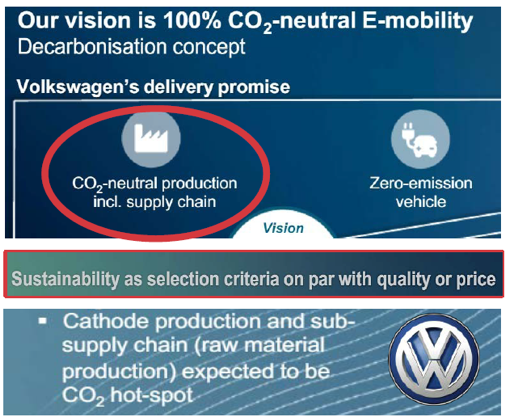
Like the wider market for EVs, demand for the low, or ideally zero carbon emitting vehicles will only grow with more manufacturers demanding carbon neutral production supply chains.
EVs in Europe
Europe is on track to triple the number of electric vehicles on its roads by 2021 and will easily meet the EU's car CO2 emissions target by 2025.
Europe, and Germany specifically, is an emerging hub for battery and EV manufacturers as growth in the sector surges.
Just last week Elon Musk announced that Tesla will soon join the world’s largest automakers — including Volkswagen, BMW and Mercedes — in Germany, seeking to tap into Europe’s EV market.
Tesla has settled on a location outside of Berlin to build a “gigafactory”, where it will produce batteries, powertrains and electric vehicles, starting with the Model Y. The factory is expected to go into operation at the end of 2021. This is just one of many gigafactories being built in Europe in the early 2020s.
There are hurdles.
The industry is growing so fast that by the mid-2020s demand from the EU alone for battery-quality lithium hydroxide is forecast to equal the entire current global demand.
Vulcan’s zero carbon solution
Located at the heart of the European auto and lithium-ion battery industry, ASX listed Vulcan Energy Resources (ASX:VUL) formerly Koppar Resources, is working to bring “Zero Carbon” lithium to Europe’s EV supply chain in a move that could transform the industry.
Vulcan is on track to develop Europe’s — and the world’s — first Zero Carbon lithium project, while generating a renewable energy by-product.
This comes at an opportune time, with demand from the EU for battery-quality lithium hydroxide forecast to equal the entire current global demand by the early 2020s.
Working in its favour is it has by far the largest lithium project in Europe — a globally significant Exploration Target of 10.73 - 36.20Mt of contained Lithium Carbonate Equivalent (LCE), at its project in the Upper Rhine Valley of Germany.
Europe, being a densely populated region, has few locations where producing lithium is possible from traditional hard-rock sources even if lithium is present, so given Vulcan’s project’s location, its low impact extraction method and its potential scale, it’s in a perfect position to serve the growing German and European EV industry.
General Information Only
S3 Consortium Pty Ltd (S3, ‘we’, ‘us’, ‘our’) (CAR No. 433913) is a corporate authorised representative of LeMessurier Securities Pty Ltd (AFSL No. 296877). The information contained in this article is general information and is for informational purposes only. Any advice is general advice only. Any advice contained in this article does not constitute personal advice and S3 has not taken into consideration your personal objectives, financial situation or needs. Please seek your own independent professional advice before making any financial investment decision. Those persons acting upon information contained in this article do so entirely at their own risk.
Conflicts of Interest Notice
S3 and its associated entities may hold investments in companies featured in its articles, including through being paid in the securities of the companies we provide commentary on. We disclose the securities held in relation to a particular company that we provide commentary on. Refer to our Disclosure Policy for information on our self-imposed trading blackouts, hold conditions and de-risking (sell conditions) which seek to mitigate against any potential conflicts of interest.
Publication Notice and Disclaimer
The information contained in this article is current as at the publication date. At the time of publishing, the information contained in this article is based on sources which are available in the public domain that we consider to be reliable, and our own analysis of those sources. The views of the author may not reflect the views of the AFSL holder. Any decision by you to purchase securities in the companies featured in this article should be done so after you have sought your own independent professional advice regarding this information and made your own inquiries as to the validity of any information in this article.
Any forward-looking statements contained in this article are not guarantees or predictions of future performance, and involve known and unknown risks, uncertainties and other factors, many of which are beyond our control, and which may cause actual results or performance of companies featured to differ materially from those expressed in the statements contained in this article. S3 cannot and does not give any assurance that the results or performance expressed or implied by any forward-looking statements contained in this article will actually occur and readers are cautioned not to put undue reliance on forward-looking statements.
This article may include references to our past investing performance. Past performance is not a reliable indicator of our future investing performance.


